Distinguished Critique: The New Gods (Book One): Bloodlines Review
Occasionally blunt, this volume's issues nevertheless wrap intriguing themes around a conflicted, complex central character
—by Nathan on September 6, 2025—
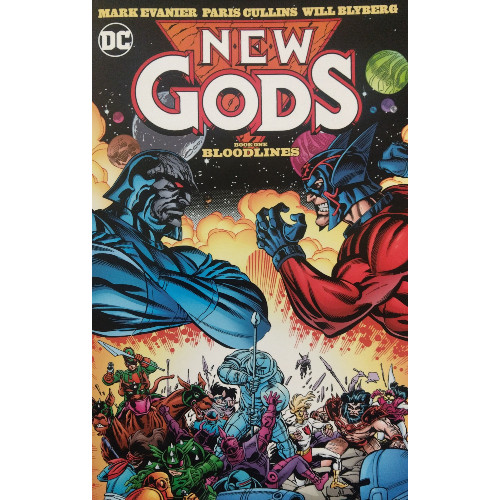
Today's review is brought to you by the King of comics himself…Jack Kirby.
Without Kirby's imagination, we would have not have been given the New Gods, his pantheon of superhuman deities. If you want to toss a little credit Marvel's way for helping cause the fallout which led to Kirby's departure from the House of Ideas, sure, we can sprinkle a bit of that in there. Once at DC, Kriby let loose a series of interconnecting titles, creating the Forever People, Mister Miracle, and his elaborate New Gods such as Highfather and Orion. And, of course, we cannot forget perhaps his most memorable creation, the dark god, Darkseid of Apokolips, the villain who supposedly would, in part, inspire Jim Starlin in his creation of one of Marvel's most magnificent madmen, Thanos of Titan.
I've not read any of Kirby's DC material (shocking, I know), though I hope this blog will serve as the thrust necessary to push me in that direction. Though I eagerly await to dive into Kirby's massive mythology, I will settle today for the New Gods' post-Crisis adventures. Kirby himself wrote what was intended to be the culmination of his saga in The Hunger Dogs graphic novel, though the resulting story ended up a mishmash between Kirby's intentions and his DC superiors' wishes. Other hands had molded Kirby's mythology, such as Gerry Conway and Steve Englehart, though none, it seems, had been able to bring the same level of unfettered power and raw imagination as the King.
For a non-Kirby series, I'm talking a lot about Kirby. Sorry! The context is needed. Where our story begins is where a different story ends: Jim Starlin's Cosmic Odyssey had seen Darkseid, fairly fresh from an early defeat during the Legends crossover, once again failed to take hold of his beloved Anti-Life Equation…kinda. For the dark god didn't possess the equation, but he had walked away from the event with a small piece of Anti-Life itself. It's here, in the wake of the Odyssey, that Kirby's former production assistant, Mark Evanier, reintroduces us to the New Gods for a new status quo.
The New Gods (Book One): Bloodlines
Writers: Mark Evanier, Jim Starlin, and Paris Cullens
Penciler: Paris Cullens
Inkers: Will Blyberg, Bob Lewis, Al Vey, Denis Rodier
Colorists: Tom Ziuko, Julianna Ferriter, Gene D'Angelo
Letterer: Bob Pinana
Issues: New Gods #1-14
Publication Dates: February 1989-March 1990
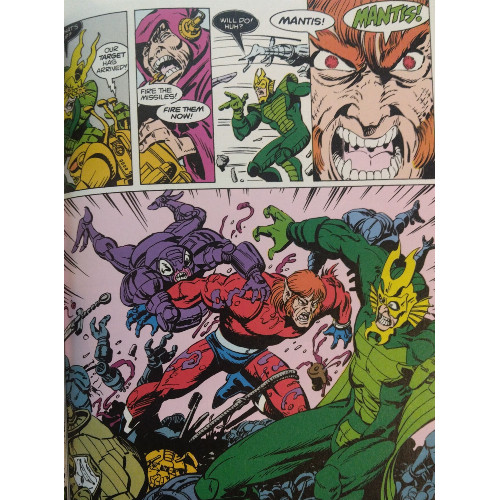
As I have not read Kirby's original material, I will not be using this blog as a commentary on how well Evanier draws the 70s series and characters into the late 80s. This does not appear, at first glance, an attempt to update or modernize the New Gods. Some heroes, including Orion or Lightray, appear in modern clothing at moments and hang out occasionally on an Earth clearly set in the 80s, but this series is not meant to make them cooler or more fashionable or "current" in any way. This isn't Superman crowing about his Americanism during the Cold War or Wonder Woman preventing Ares from committing nuclear annihilation.
(though I'll be coming back to that last comment…)
Evanier, with some help from Starlin, is very intent on developing through this series a missive on identity, taking the characters Kirby had fashioned and exploring their innermost crevices. His focus is on Orion and his development, yet as we shall see, other characters are allowed the opportunities to grow and be explored as Evanier cracks them open to determine just why they behave the way they do.
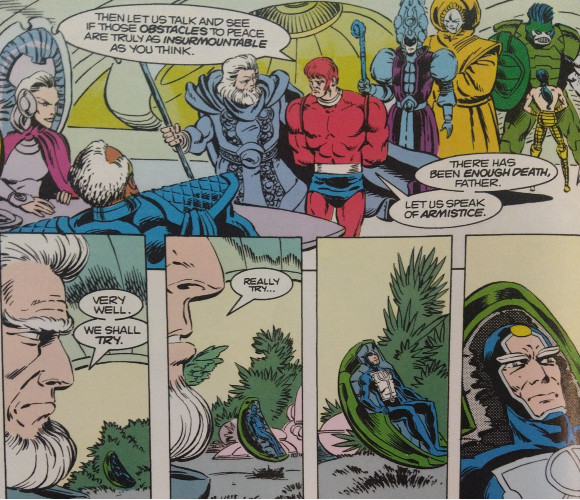
For the uninitiated, Orion is the son of Darkseid, traded as a child to Highfather of New Genesis in exchange for Scott Free (the future Mister Miracle) as a token of peace between New Genesis and Apokolips. Though raised on New Genesis, Orion maintains his father's more barbaric personality, a warrior through and through. He is a man at war with himself, his tempers roiling with the warrior rage that is his birthright yet understanding the peace, love, and care with which he was offered by the New Gods. He wishes not to be like his father and, to that end, wages war against the forces of Apokolips, yet as Evanier endeavors to point out, this is Orion's blindspot. In seeking to destroy his father, Orion risks becoming exactly like the dark god. It matters not that his rage is directed at Apokolips or that he would stamp out Darkseid's evil; in following his wrathful heart, Orion could very well destroy himself and New Genesis through the violence he sheds to prevent death.
This is Evanier's thesis in a nutshell, and the writer spends a decent chunk of time exploring this concept…somewhat subtly. Evanier does a very good job in developing an intriguing, ongoing story around Orion, constantly propelling him forward and drawing him into situations where his heart is tested. Early on, Orion brings the body of Forager, a hero slain during Cosmic Odyssey, to his people, the Insect Empire. Orion, for reasons I assume Kirby developed, hates the Insect Empire; faced with Forager's humanity and sacrifice, Orion struggles through the process, debating whether he can find peace with these creatures or if he's just fated to hate them forever. The warrior later explores his parentage in the six-part "Bloodline Saga" from which this volume takes its name, trawling Apokolips for his mother, the one person he believes can tell him he is not like his father and can show him another side to his personality and reveal that he does not need to grow into the monster Darkseid has become.
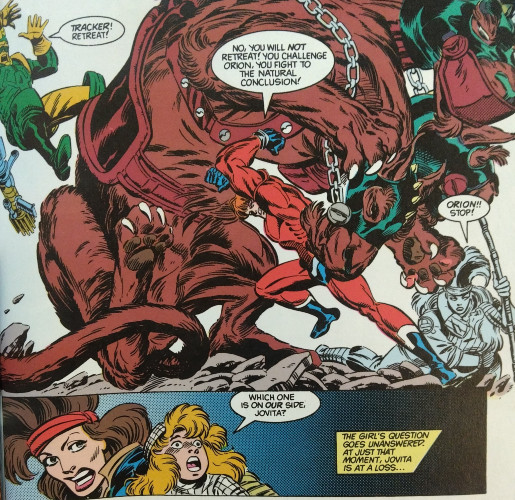
If that last sentence seemed heady and long-winded, it was to prove a point. Evanier's theme is strong within the stories themselves, always present and motivating our central New God, but he is blunt to a fault. All that I said in that final sentence is not necessarily my own takeaway; it's what Evanier absolutely wants you to believe and draw from the story, and even as he creates memorable scenes and places Orion in spots where the warrior must struggle–overcoming his hatred of the Insect Empire, finding his birthright, battling his way through Apokolips–the dialogue and narration is often heavy-handed. When Orion faces a being which takes on the form of people's greatest fears, he sees himself, which on its own would make for interesting commentary. But Orion verbalizes that he's facing himself, other characters tell us Orion is fighting himself, and still others comment multiple times on the creature's ability to mirror deepest fears. It feels Evanier doesn't necessarily trust his reader to pick up on those inferences after the first reference and thus reminds us repeatedly.
Orion's internal warfare does not represent the only struggle present; if anything, his use of violence against Darkseid's violence is intended to mirror the larger conflict between New Genesis and Apokolips. Traded for Scott Free, Orion was meant to be raised in the freedom of New Genesis, yet unable to abandon the bloodlust which is, in part, his birthright, he still resembles his father in dark ways. Through taking life does Orion preserve the lives of others, finding himself at a divide between his Apokoliptic nature and his New Genesis training. He desperately seeks an identity he is not fully aware of, maybe even fooling himself into believing he's more different from Darkseid than he actually is. Other characters refer to Orion as a microcosm of the war between the two planets and worry that if Orion were to tip deeper in favor of violence, even against Darkseid, then the grim forces of Apokolips may still find victory.
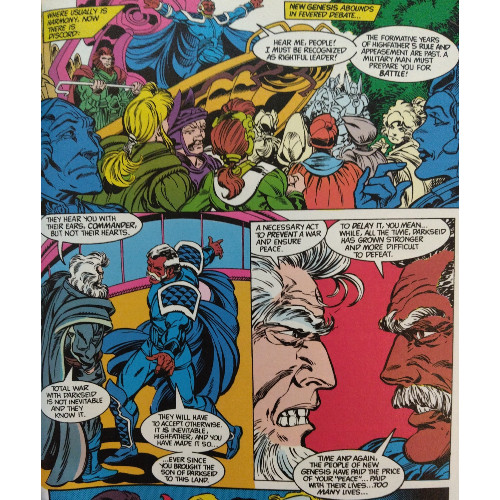
Around Orion are the other members of Kirby's pantheon, each facing their own struggles throughout these issues. Highfather seeks control over New Genesis after revelations cast aspersions upon his rule, as people question whether secret, grim steps taken by New Genesis to ensure peace should rightly vilify their leader. New God Lightray explores an engaging mystery which seeks to plumb the history of the deep conflict between his home and Darkseid's, and his relationship with a young woman causes conflict for her of which he may be unaware. Evanier's most interesting supporting character is Kalibak, Orion's half-brother; he serves as Orion's foil, doing everything he can to seek Darkseid's approval yet failing time and again. Evanier uses him to generate the bitter irony that Darkseid's favored son desires to be his greatest enemy and that his most dutiful child is relegated to the status of an obedient yet useless lapdog.
A bit of Cold War intrigue factors into this series, primarily as one narrative deals with the nuclear annihilation of an entire people group. The moment is shocking, perpetrated by the searing hatred of one character, and used as a seeming solution to a larger problem. In one moment, resolution is presented, to the relief of the reader, yet in the next, devastation is inflicted upon a people undeserving of such wrath. It's a telling moment for the character in question, and written by Jim Starlin, remains the highest emotional scene in the volume. Elsewhere, New Genesis debates over seeking arbitration or war with Apokolips, and the populace is rocked by political secrets which point to a possible loss of faith in their government. These interpretations I am basing on my own ruminating, meaning Evanier much more capably weaves in any social commentary than he does certain aspects of characterization.
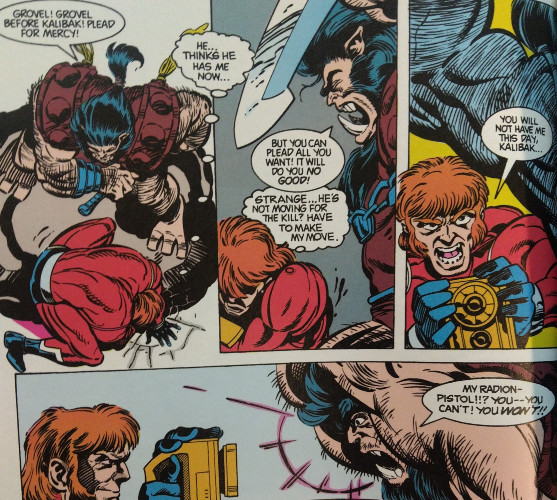
The best gods or deities in stories, comics included, are ones which show their penchant for humanity even as they embrace incalculable power, incredible longevity, and responsibilities which are far beyond the understanding of men. As George Perez humanized the Olympian pantheon in Wonder Woman, so do Evanier and Starlin bring recognizable personalities to their gods, Orion most prominently. The son of Darkseid knows his parentage but seeks his heritage in these issues, wondering if he is destined to grow into the same monster as his father or if another destiny awaits him. Around him stirs other gods and monsters, as war appears on the horizon, with Orion representing the Doomsday Clock ticking closer to devastation between the planet where he was born and the home where he was raised. These factors play deeply into these issues, sometimes a tad too obviously for my taste, but are at other times used well by the writers to define their characters' core characters and the kinds of gods they already are and are still becoming.